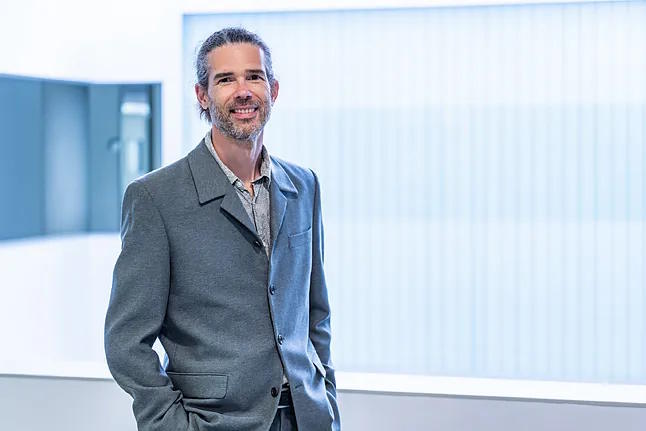Maximizing transplants. The goal of Flip Klijn's team is to find new ways to incentivize donations. "If our algorithm demonstrates that we can increase the number of beneficiaries, it will be a huge step forward." The Dutch scientific director of the Institute of Economic Analysis, CSIC, and Research Professor at the Barcelona School of Economics explains how, being outsiders to the process of cross-border kidney transplant programs, they have designed a system that enhances the method for assigning compatible kidneys from donors unknown to the recipient.
Spain is a leader in transplant matters and is looking for new options to continue offering solutions to patients. In 2024, it broke records again with over 6,400 transplants, surpassing expectations. Last year, 16 living kidney transplants were performed in the context of the Cross-Border Kidney Transplant Program managed by the ONT. In these interventions, each patient is accompanied by an incompatible person who is willing to donate their kidney to another in a partner exchange. This process aims to shorten waiting times.
Last year, four cycles of two transplants (four exchanges of two pairs), a cascade of three, and a chain of four initiated by an altruistic donor were achieved. Additionally, a patient from Spain underwent an international cycle of three transplants carried out with Portugal.
Alongside Klijn, the algorithm has been developed by Péter Biró, senior researcher at the Center for Economic and Regional Studies HUN-REN and full professor at the Corvinus University of Budapest (Hungary); Xenia Klimentova, senior researcher at the Business Management Systems Center of the Institute of Engineering, Technology, and Computer Systems, INESC TEC Porto (Portugal); and Ana Viana, coordinating professor at the School of Engineering of the Polytechnic Institute of Porto and senior researcher at the Industrial Engineering and Management Center of the Institute of Engineering, Technology, and Computer Systems, INESC TEC Porto (Portugal).
Klijn and his team propose an innovative approach: one patient, multiple donors for each. "If a patient is supported by several potential quality donors, whether family or friends, offering their kidney for the patient to receive, they have more opportunities than others," explains Klijn. And he elaborates: "In that waiting list, he contributes two or three kidneys that can find a match faster than if he only offers one." Through an article published in Mathematics of Operations Research, the researchers have verified the effectiveness of this novel strategy based on game theory, which encourages each patient to include more than one donor in cross-border kidney transplant programs. "This is interesting from the perspective of seeking new incentives for altruism," says Klijn.
The designed algorithm prioritizes recipients who bring more potential donors into the program. "The more and better donors are provided, the higher the probability of receiving the compatible kidney needed," emphasizes Klijn. "This is crucial because it encourages patients to seek the best donors, benefiting other patients and at the same time increasing their own chances of receiving a good kidney, improving the program's performance for society as a whole."
The researchers' proposal earned them the Society of Statistics and Operations Research (SEIO)-BBVA Foundation Award for the Best Applied Contribution with an impact on social, innovation, or knowledge transfer in the field of operations research, as they believe their technique would have a significant impact on expanding the scope and effectiveness of national and international cross-border kidney transplant programs. "Through mathematical analysis and simulations, we have found that some methods based on game theory offer significant benefits," explains the Dutch mathematician based in Barcelona. How would the system work? "First, it encourages patients to provide high-quality donors. Second, our proposals could help expand renal exchange programs internationally, something crucial in a global context where the demand for organs far exceeds the supply. Additionally, we have developed algorithms that quickly find the best possible matches," justifies Klijn.
With all this, the Dutch researcher highlights how disciplines unrelated to Medicine contribute to its advancement: "Operations research provides us with the necessary tools to optimize resources and ensure that the proposed solutions are fair and equitable." And, in fact, he trusts in its transversality "as it can be applied to other contexts of exchange without monetary transfers, such as time banks or the Erasmus program, which facilitates student exchanges between universities."
In fact, their proposal is already ready to be implemented. The ONT presented the EURO-KEP project to the European Commission, aiming to build a pan-European cross-border kidney transplant program that allows donor-recipient pair exchanges between a greater number of countries, with common software and operating rules, finding "optimal combinations."
"There are several working groups that we have planned. One working group led by mathematicians and computer scientists is developing a highly enhanced software that will allow us to search for the best possible combinations and also include pairs from different countries," explained the director of the ONT, Beatriz Domínguez-Gil, during last year's presentation. The incentivizing algorithm developed by Klijn's team is included in this working group. "This will help solve the most complex recipient cases and make better use of resources (existing donors)," she assures, emphasizing that it aims to provide an extra layer of efficiency to the system. Additionally, she adds, "opening up the opportunity for international transplants."
For now, through EURO-KEP, they will conduct simulations and pilot exchanges of national and international paired kidney exchanges to demonstrate their effectiveness and the importance of their implementation. "Once these steps are taken, we could put into practice and demonstrate the validity of our hypothesis," she concludes.
